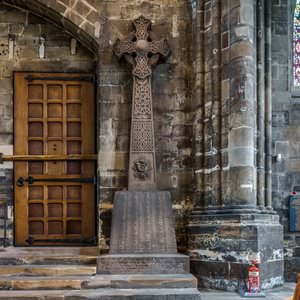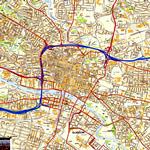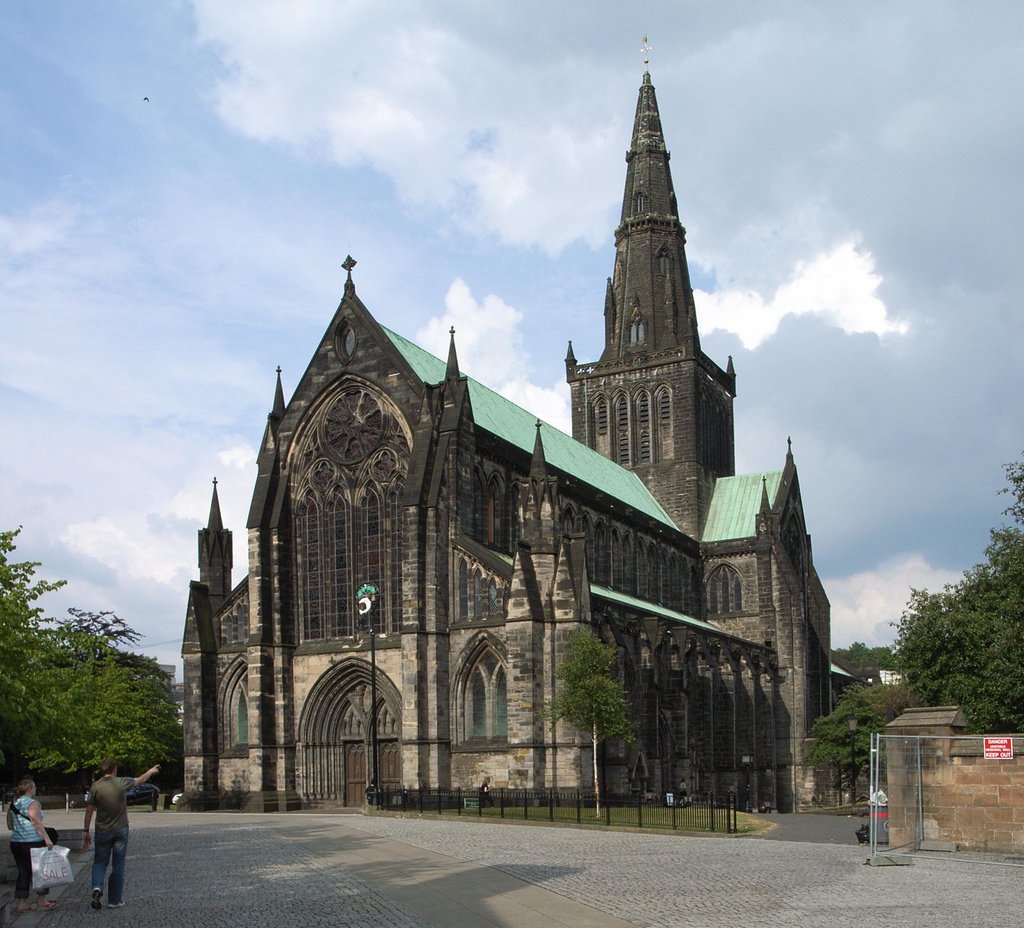Excursion tour in Glasgow. Top architecture - monuments, castles, temples and palaces
 Any review of the architecture of Glasgow would be incomplete without mentioning Glasgow Cathedral, Mitchell Library, Hampden Park, Tolbooth Steeple, . The virtual flight over these monuments in HD (the video is on the left), the photo galleries of Glasgow, and the most interesting facts about every sight – we have carefully prepared lots of useful information for you. The overview architecture map of Glasgow at the bottom of the page will help you not to get lost in your sightseeing routes of Glasgow. So, let’s go!
Any review of the architecture of Glasgow would be incomplete without mentioning Glasgow Cathedral, Mitchell Library, Hampden Park, Tolbooth Steeple, . The virtual flight over these monuments in HD (the video is on the left), the photo galleries of Glasgow, and the most interesting facts about every sight – we have carefully prepared lots of useful information for you. The overview architecture map of Glasgow at the bottom of the page will help you not to get lost in your sightseeing routes of Glasgow. So, let’s go!
Glasgow Cathedral, Glasgow
Location on the map:  Facts:
Facts:
» There used to be a small chapel on the site of the cathedral founded by missionary and apostle Kentigern, known as Mungo (meaning ‘my dear’). The cathedral is named after him. » Glasgow Cathedral was consecrated in 1136. The ash of the patron of Glasgow rests in one of the parts of the cathedral.
» The construction has different names: the High Kirk of Glasgow (common in the Christian community), St Kentigern’s or St Mungo’s Cathedral.
» 500-year sculptures reminding of the seven deadly sins are installed on the 14th-century wooden roof. Wooden structures and slabs also date from that time.
» The building is 100 metres long. The pictures on some stained glass windows are similar to symbols of military regiments that took part in World War II. The walls are decorated with mosaic pictures from the revered saint’s life.
» The cathedral is divided into two churches – Upper and Lower. The building itself stands on a slope.
» Inside, there are dark high Gothic vaults supported by straight columns. The stairs lead to the Lower Church. Stone fragments of the 12th-century cathedral are preserved here.
» The Bridge of Sighs connects the cathedral with a hill where the Glasgow Necropolis – a city cemetery with old gravestones and vaults – was erected.
» 200,000 people visit the cathedral annually.
Mitchell Library, Glasgow
Location on the map:  Facts:
Facts:
» Stephen Mitchell, an industrialist having great wealth, was a patron of art. He willed a substantial sum of money for the construction of a library building. » In 1877, the house of books was opened for visitors. The building is crowned with a copper green dome with a statue of Minerva, the ancient Roman goddess of wisdom.
» The initial collection included 14,000 books. The library currently consists of three buildings. The main book deposits are found in the building adjacent to the main one.
» The list of works present in the library includes about 1.5 million volumes, plus more than 35,000 archival documents, newspapers, films, and a photo archive.
» Ancient handwritten scrolls, the data from the city archive (from the 12th century), and all available materials on the life and work of Robert Burns, a Scottish poet and folklorist of the 18th century, are considered to be particularly valuable items.
» The Mitchell Library has huge shelves containing a lot of book volumes on a variety of topics.
» There are reading rooms with access to the World Wide Web, a huge online database, a reader service department, a cafe, and a 418-seat theatre.
Hampden Park, Glasgow
Location on the map:  Facts:
Facts:
» Over the course of history, there used to be three stadiums in the city having the same name. » The first one (1873) had lasted for 10 years. A local game team held several final cups. However, the railway company decided that its railroads should lie through the area, so the stadium was closed.
» The next Hampden was built farther from the first one. A local football club decided to expand the playing field, but the landlords refused to provide land.
» The administration bought a new lot half a kilometre away from the site. The third construction was built there and named Hampden Park.
» The stadiums were named after a famous English politician of the 17th century, although he had nothing to do with football.
» The sporting arena was opened at the end of October in 1903. The stadium was considered to be the largest one in the world then.
» Over 64,000 spectators gathered for the cup final. Each subsequent game increased the number of fans. The world record is over 127,000 people.
» There are lighting masts along the territory of Hampden. The capacity reduced dramatically.
» The Scottish Football Museum and football community offices are located within Hampden.
Tolbooth Steeple, Glasgow
Facts: » The only old construction in the centre of the city square that managed to survive is the tower that used to be a part of the municipal building. The seven-storey brick building was constructed between 1625 and 1627.
» It has a clock, a stone superstructure, crowned with a weather vane in the form of a rooster.
» The construction used to be a part of a large building called Tolbooth. It was simultaneously a dwelling house, the city council headquarters, and jail.
» A cobblestoned square stretches in front of the Tolbooth. Government decrees were read out here, mass events were held, and criminals were executed. The building finally fell into disrepair. The only part that the city hall managed to repair was a clock tower.
» At first, the Tolbooth extension served as a tower for fire detection and an observation tower, from which the surroundings could be observed.
» The rectangular structure consists of massive stone blocks connected to each other. It is divided into floors. The lower part is plain, without decorations. It is a clock that makes the tower beautiful. There’s a decorative top – a gothic roof with spires – attached above it.
» There’s an observation platform. The inside contains lifting mechanisms.
This guide to architecture monuments in Glasgow is protected by the copyright law. You can re-publish this content with mandatory attribution: direct and active hyperlink to www.orangesmile.com.
City tours, excursions and tickets in Glasgow and surroundings
Plan your own tour over Glasgow on the monuments map
Hilton builds third luxury hotel in Kyoto
The Hilton Kyoto hotel will be attractive to a wide range of guests. Leisure travelers will appreciate the close proximity to famous attractions such as Heian and Yasaka Temples, the Kyoto Imperial Palace, and the scenic Gion Historical District. In a few minutes, guests can reach the metro stations, the path to the sights of interest will not take much time. Read this
Read this
26.04.2024
The Hilton Kyoto hotel will be attractive to a wide range of guests. Leisure travelers will appreciate the close proximity to famous attractions such as Heian and Yasaka Temples, the Kyoto Imperial Palace, and the scenic Gion Historical District. In a few minutes, guests can reach the metro stations, the path to the sights of interest will not take much time.
26.04.2024


 English
English Russian
Russian Dutch
Dutch German
German Spanish
Spanish French
French Türkçe
Türkçe

















